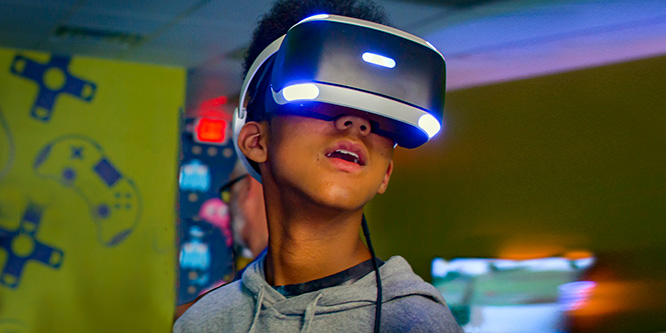
Photo: @SBphoto via Twenty20
Can the metaverse count on Gen-Z gamers?
Gen-Z is expected to lead the creation of the metaverse, drawn by the allure of gaming, but some surveys indicate that even digital natives need to be convinced of the value of visiting virtual worlds.
Piper Sandler’s “Spring 2022 Generation Z Survey” found that 48 percent of teens are either unsure or uninterested in the metaverse. While 26 percent owned a VR device, just five percent said they use it daily and 17 percent use it weekly.
Zipline’s “Retail Metaverse Report” found that 80 percent of Gen-Z respondents are “familiar” with the metaverse and 51 percent have participated in it through gaming, purchasing non-fungible tokens (NFTs) or other activities. Gaming was by far the primary reason across generations for participating in the metaverse.
Eighty-five percent of Gen-Zers, however, reported feeling indifferent about brands developing a presence in the metaverse and 43 percent said “understanding” was keeping them from participating in the metaverse.
“It’s still very early days for retail in the metaverse,” said Melissa Wong, Zipline’s CEO, in a statement. “The majority of consumers across all generations have yet to utilize the metaverse in any capacity, and those who have are prioritizing games over shopping. Nonetheless, this creates a unique opportunity for retail brands to establish themselves as leaders in the new virtual economy.”
More bullish was a study from Razorfish and VICE Media Group that found Gen-Z gamers spend 12.2 hours per week playing video games versus 6.6 hours hanging out with friends in person. Of the Gen-Z gamers surveyed, 57 percent feel they are able to self-express more openly to others in a game than they do in real life, 47 percent would like to meet new people in the metaverse and a third would like to use it to build a career.
“Gen-Z gamers view the metaverse as a safe place to freely express themselves, experiment with identities, establish friendships and ultimately create a world they want to live in,” said Nicolas Chidiac, brand strategy lead at Razorfish, in a release.
Several brands and retailers targeting younger consumers, including Nike, Gap, Pacific Sunwear and Forever 21, have been at the forefront in creating metaverse experiences on social gaming platforms such as Roblox.
- Piper Sandler Completes 43rd Semi-Annual Generation Z Survey of 7,100 U.S. Teens – Piper Sandler/Business Wire
- Despite Retail’s Investment in the Metaverse, New Study from Zipline Finds 85% of Gen Z Is Indifferent About Brands Establishing a Virtual Presence – Zipline
- Razorfish Study Finds 52 percent of Gen Z Gamers Feel More Like Themselves in the Metaverse than in Real Life – Razorfish/Business Wire
Discussion Questions
DISCUSSION QUESTIONS: Are marketers relying too much on young gamers to establish the metaverse or is gaming the path to building interest? Do marketers need and can they create a more balanced pitch for the metaverse beyond gaming?


Could it be that some retailers are taking a page out of the Apple playbook and planting the seed in the earlier stages of life to make these “gamers” their steadfast customers when they grow up?
I am sorry. I still don’t see the metaverse as a significant tool for shopping. The expected transition of young gamers to adult metaverse users is beyond my comprehension. Even my gaming grandchildren (all teens) use a more traditional approach when they shop — even when they shop for electronics for their games. The ones that are not gamers say “not interested.”
Gaming isn’t just the path to building interest, it is the path to building – period. Most marketers won’t have a need to actively participate in metaverse (a word that hilariously my spellcheck doesn’t have in its vocab) until functionality increases and the audience using it has a larger disposable income.
Brands attempt engagement in metaverse and web 3.0 – some may “hit,” some may not. At that point, it’s really important to listen and evaluate why something didn’t succeed. Think of the metaverse being available for all ages and breaking the fourth wall. You are no longer being spoken TO but you are part of the conversation. Everyone loves this.
Marketers are paying too much attention to semantics and too little attention to behavior. If you define “metaverse” broadly enough to include any and all AR/VR/MR experiences you tend to be more bullish about it. If, on the other hand, you understand that gamers like to play games but not necessarily invest in virtual real estate, your view is going to be a lot more bearish. In the same way the ill-conceived, and incorrect, word “omnichannel” forced our thinking and activity into a buzzword, the word “metaverse” can be used to mean anything you want it to mean, which is to say it too is meaningless. There are specific technologies, specific online behaviors, and specific, very specific if these surveys are to be believed, consumer behaviors. All that putting them into an intellectual blender and hitting the “High” button does is make the individual elements harder to identify, it doesn’t turn them into a distinct entity — at least not yet.
Online shopping is here to stay, but it’s a one-way street: brands don’t get the kind of feedback they would get from interactions in brick and mortar shops. A metaverse presence gives them an occasion to get that back. And so far, the only metaverses that are sufficiently established, operational and getting traffic are the gaming ones — even though they’re more and more about much more than gaming. Curious to see how successful Burberry or Gucci will be in Roblox.